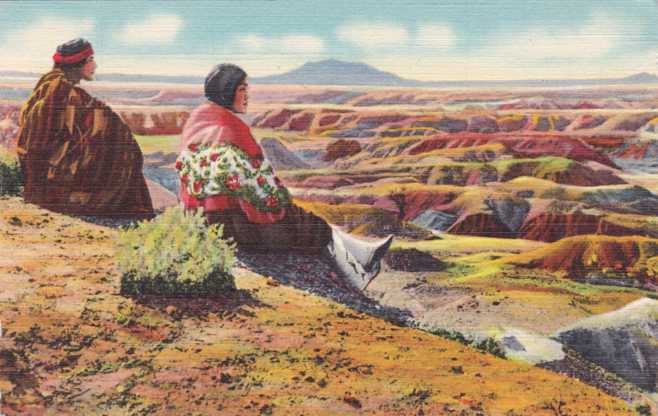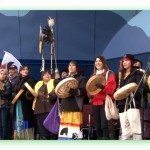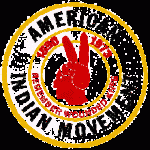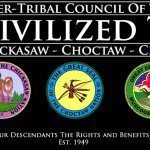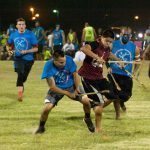Published Tuesday, January 25, 2000
Newspaper of the Hopi Tribe Vol.X No.2
Executive Branch Chairman Wayne Taylor ~ Vice-Chairman Phillip Quotshytewa The Chairman is from the Sun Clan of Shungpovi and the Vice-Chairman is from the Bear Clan of Kykotsmovi. Elected by the Hopi people in 1997 both men are involved in several critical issues on which they will keep the public updated.
Introduction
Vice Chairman Phillip Quochytewa, former Hopi Tribal Chairmen and Vice Chairmen, Student Council Presidents, CSA’s, Village Leaders, honored guests and my Hopi people: Congratulations! Together, we have concluded two productive years of service to the Hopi people and today, we celebrate the beginning of the Year 2000, Lolmasani.
This is an exciting event, it is the first State of the Hopi Nation Address in the new millennium. While the world has celebrated Y2K, we at Hopi celebrated Y3K and according to others, Y4K. The Hopi people have been around for a long time and that is cause for celebration.
What is a State of the Hopi Nation Address? The State of our Nation Address is my opportunity to report on how well the Hopi Nation is doing.
This is our opportunity to take stock of our progress as we continually move into the future. Our Hopi tradition teaches us to periodically pause and look back to where we have been and then forward to where we hope to be tomorrow. Today is just such a time of pause and reflection.
My State of the Hopi Nation is measured against how well the Hopi people are doing. The best indication of our Nation’s health is how well our children are doing. They are the pulse and temperature of our Nation and they serve as the light we must hold high and follow. Their preparation for the future is a gauge of the Hopi Nation’s preparation for the future.
Lolmasani is about not losing sight of our children if they are to carry on the traditions and values of our ancient culture. Teaching our children stewardship if we expect them to keep the covenant with Massau. Showing our children the principles of suminangwa and naminangwa if we expect them to value the strength and beauty of the Hopi way of life.
Lolmasani is our vision as Hopi people. Without a strong younger generation, the fight for our land, water, culture, language, and self governance would be meaningless. Without a strong younger generation, our dream of a sustainable Hopi Nation will remain just that, a dream. We are all caregivers for our children and therefore caregivers of our own future. We are responsible for creating our own destiny by our intentions of good or ill will. It is up to us!
Lolmasani is about working together. Two years ago, during my inauguration, I signaled a call for us to begin the task of working together for the common good of the Hopi people. It is our opportunity to harness individual talents and skills and put them to work in order to make life better for the Hopi people. I have come to realize that the building of a sustainable Hopi Nation is a lifelong process. The work is never done and the task can never be put aside.
The challenges and opportunities for creating Hopi sustainability are already well in motion, propelled by both internal and external pressures. We are engaged in the battle of the century to survive on our homelands by keeping what is left of our ancestral lands and by making certain there will be lifegiving water for our children and their children because we intend to survive for another 1,000 years!
Protecting Hopi land
Let me first address an issue of great importance to the Hopi people. I speak specifically about the 1882 Reservation land issue which is finally coming to its conclusion. As you know, the Navajo-Hopi land dispute has consumed our efforts and resources for over 100 years and has survived many tribal administrations. We have dealt with this issue long enough and it is time for us to move forward and away from this contentious issue.
In 1996, the Navajo-Hopi Land Dispute Settlement Act was ratified by Congress, bringing an end to the centuries old dispute in what is considered to be one of the first Peace Treaties between two tribes. This is an historic accomplishment because as Hopi people, we have always supported a peaceful resolution to this difficult and painful matter. On February 1, 2000 we will finally assume full control and jurisdiction over the Hopi Partitioned Lands – and we will no longer be second class citizens on our own lands.
Unfortunately the challenge is not over. February 1st marks the day when Navajo individuals who did not sign an accommodation agreement and who did not sign up for federal relocation benefits will become trespassers on Hopi land. “What will happen to the resisting Navajo?” Contrary to the media campaign of the resisting Navajo, I expect that most, if not all of the resisting Navajo will remain on Hopi land while they contest their eviction from Hopi lands. Under the law, which we have always abided by, this process will be handled by the federal courts over the next year or so. Once the process is complete and the resisting Navajo have had their day in court, they will either peacefully leave our land or they will be removed. This terrible chapter in Hopi history will then close and we must vow to never let it happen again.
To the outside world, I say, let this century of uncertainty be over for the Hopi people once and for all. Let us enjoy what little is left of our ancestral homelands in peace. Let there be peace on these lands today. Let there be peace tomorrow and forever.
The Challenges
My Hopi people, as you know, we live in an increasingly difficult and challenging world. Our survival is threatened from so many directions and in so many ways. One of our greatest challenges is to find ways to build our economy. 50% or more of our Hopi workforce is unemployed and the shortage of affordable housing for our families has become desperate. Our dependence on revenue from the sale of our coal must change and we must stop the use of our drinking water to slurry coal. This is the position of the Hopi people and I remain steadfastly committed to it.
We live in times of great uncertainty. Disrupting influences from the outside world continue to threaten our way of life. Our overall wellbeing as a Nation is effected by increasing attempts to legislatively undercut our self governance, unrelenting cuts in our federal appropriations, more pronounced threats to our sovereignty, rapid changes in the corporate world, the overwhelming impact of technology on the Hopi way of life, and changes in U.S. and national world powers. Such pressures, combined with the scars from past attempts at destroying Hopi and indigenous religious traditions have changed native societies, including ours, on a grand scale today.
Nation Building
Despite the changes and the challenges, I am optimistic. I believe in Lolmasani. We have the capacity for creating a strong, sustainable Hopi Nation that will endure tomorrow and beyond. Our religion and our beliefs will continue to sustain our individual and collective spirit. From this inner most strength, lies our potential as a people to be the architects of a future where Hopi society merges the goodness of our Hopi ways with the modern future.
This is the Hopi Nation we have begun to build – and lest we forget that we stand on the shoulders of those who came before us, let me say thank-you to all the previous Chairmen, council members and the Hopi people (in and out of tribal government) for their contributions to our Nation building – and if we join together to continue the work at hand, we can strengthen our Hopi Nation for the 21st century. I am extremely proud to report that the Hopi Tribal Council, our General Counsel, the Land Team, the Energy Team, Water Rights Team and the Taylor/Quochytewa administration have worked side-by-side, cooperatively as partners to initiate a combination of policies and programs for building a strong foundation for a healthy Hopi Nation. Kwak-kwa.
Rarely have a people, such as the Hopi, lived through so much change so quickly and in so many ways. The ground has shifted beneath our feet and we find ourselves in an information age, a global economy and a world where technology dominates.
Lolmasani means that we must shape a new kind of Hopi tribal government for the information age. We may be a small government, but we are progressive. One of the most significant steps for The Hopi Tribe was getting our federal and state lobbyist on board. It is the first time in Hopi history that we have both State and federal lobbyist to assist us with important matters involving legislation and public policy. We must pursue new strategies for prosperity which include fiscal discipline through policies to more carefully and productively manage our financial resources; investments in education and vocational skills to help our youth prepare for new economic systems, new markets and new working environments. The information age is, first and foremost, an education age and we must work hard not to place our children at a disadvantage or to lag behind in a world where information changes from second to second.
What have we accomplished in two years?
Lolmasani is about healthy individuals. We all know that when we are sick, we want the best health care possible. I am pleased to report that in fiscal year 1999, we secured the final allocation of $18 million from Congress to complete the construction of the Hopi Health Care Center scheduled to open in May 2000. We will finally be able to see our family members receive dialysis treatment here at home and have access to a comprehensive wellness program — all under one roof, among the many other services not currently provided at the Keams Canyon facility. Our facility will also provide state-of-the art telemedicine that will connect patients and their local doctors with medical specialist at great distances using computer technology.
In addition, the construction of staff quarters for the Health Care Center is underway. The Hopi Tribe has entered into bank financing to build homes for our medical staff. A construction contract was issued for $7 million and Congress has appropriated $3 million in FY 2000 to help pay down this cost. My deep appreciation goes to Robert Sakiestewa, Chairman of the Health Care Steering Committee and its members for their diligence and hard work. Kwak-kwa. Lolmasani is about safe educational facilities for our children and providing our children with the most exceptional and quality educational system from Kindergarten through 12th grade. I am pleased to report on three areas regarding education:
1. Polacca Day School is now ranked number 4 on the priority list for replacement. We anticipate funding from Congress as early as November 2001 to build a new school including their long sought after multi-purpose center at Polacca. This is quite significant since over 500 schools nation wide are competing for construction funding to replace their facilities. My deep appreciation goes to the Polacca Day School Board and the First Mesa Leadership who have worked with my office in lobbying for the school.
2. Second Mesa Day School is also scheduled to receive funding for its replacement in November 2000, this fall. We will continue to work hard to have all our schools on the Hopi Reservation replaced and to that regard, we have completed long term school facility plans for each school.
3. The reorganization of our educational system is underway. At the core of our efforts are revisions to Ordinance 36 to establish a Department of Education that will consolidate the Hopi Tribe’s Office of Education and the Hopi Board of Education into one so that we can do away with the overlapping of services, duplication, and lack of coordinated direction in curriculum and standards across all our schools. This is historic in that the Hopi people will finally assume the responsibility over their own educational system that has long been overseen by the Bureau of Indian Affairs. By working together, we can see to it that our students receive the best education possible. I want to thank my staff, the Office of Education staff, the Hopi Board of Education, BIA Office of Indian Education and the many community members and education leaders who must work through a tangle of past practices and structures to strengthen our educational system. Your task is not easy, but the rewards are lasting. Kwak-kwa.
Lolmasani is about our economic wellbeing and building a strong economic system for ourselves. If we only continue to rely on our coal revenues, we are heading towards disaster. We must therefore continue to work hard to define economic development in a way that is compatible with our Hopi way of life and understand the limits of local Hopi economic development. By doing so, we can work towards making the most of what we have and diversify our economic base so that vital funding to support Hopi tribal and village services and programs will continue for generations to come. I am pleased to report on three areas of economic development:
1. The Hopi Tribe now owns the Continental Plaza Shopping Center located in Flagstaff, Arizona. I am deeply thankful to the Land Team for their hard work in reclaiming Hopi ancestral lands and other property acquisitions for the Tribe that open up more opportunities for economic development. Kwak-kwa.
2. The Hopi Tribal Council approved the design and development of the Turquoise Trail Community. This was in direct response to the Hopi people’s desire to address housing needs, a comprehensive Tourism program, a cultural destination point, and business development. In the coming years, we will begin seeking funding for the development of Turquoise Trail Community including roads, utility lines and water. My deep appreciation goes to the Hopi Tribal Council for their responsiveness and support for this critical development.
3. We are making final preparations to bring the tax code to the public for a vote this year. I want to emphasize that this tax is not a personal income tax of Hopi individuals. Some individuals have said that Hopis do not pay taxes. This is not true. Every working Hopi pays income taxes to the federal government. Every individual who shops in Flagstaff and nearby border towns, pays business taxes levied on groceries, motels, and gas. The proposed Hopi tribal taxes are different from personal taxes. There are five proposed taxes: possessory, severance, utility, hotel and occupancy, and construction taxes. These taxes will provide badly needed additional revenue to support the services and programs of the Hopi Tribe and the villages. Your vote on these taxes will make a difference for our future.
Lolmasani is about maintaining our stewardship responsibilities over our ancestral lands outside the Hopi Reservation. I am pleased to report that the Hopi Tribe has entered into a Memorandum of Agreement with the United States Forest Service in managing resources on the Kaibab National Forest. This is significant because forest services lands, as well as other federal/state/private lands, still hold Hopi sacred sites and other natural resources that remain significantly important to the Hopi people – and we must not lose connection to these sites. MOU’s with other federal land management agencies are in the works. My deep appreciation goes to Leigh Kuwanwisiwma, Director of the Hopi Tribe’s Cultural Preservation Office and his staff for doing a wonderful job in establishing these partnerships.
Lolmasani is about ending protracted and expensive lawsuits. I am pleased to report that, after years of litigation, we have reached a settlement with the Navajo Nation regarding the Use and Damage Case pending before the Ninth Circuit Court of Appeals. This settlement of $29 million resolves the lawsuit in favor of the Hopi and prevents further appeal of the matter by the Navajo Nation. My deep appreciation goes to our General Counsel Scott Canty, Attorney Tim Atkinson of Arnold and Porter, and the Land Team for bringing this lawsuit to conclusion.
Lolmasani is about safe communities free from violence and fear. I am pleased to report that our villages and community people are beginning to assume some of the responsibility in addressing domestic violence, drug and alcohol abuse, and gang prevention. We are building strong and effective partnerships because we all know that our law enforcement and tribal programs cannot do it alone. We know that by joining together, our efforts will be stronger. I ask all of you here tonight, to join in our efforts to do something about public safety in our homes and communities. My heartfelt appreciation goes to the Hopi Women’s Coalition, our law enforcement personnel, the Hopi Tribe’s Guidance Center staff, our villages, the COPS program, and the Domestic Violence Program for working together to create an environment where violence, drugs and alcohol and gangs will not be tolerated. No level of abuse is acceptable – that is the Hopi way.
Continuing the Work
While we have accomplished significant results, many of our efforts are works in progress. Every department of the Hopi Tribe is involved in some way and many of our own people have taken the lead on these projects. Let me share a few of these efforts with you:
We are working hard to complete the Turquoise Trail highway that will extend Highway 87 and connect highway 264 to Highway 160 and thereby create another transportation artery to support community infrastructure development for the Turquoise Trail community.
We are working hard to establish a 911 emergency system for the Hopi Reservation. Much like our neighboring municipalities, this will allow our citizens to call police, fire and medical emergency services by dialing 911. It is amazing how advanced the nation is technologically, but how far behind rural communities such as the Hopi Reservation remains. We have a lot of catching up to do. Key to this effort will be the assistance of our villages to map their communities. We are working hard to establish the Hopi Tribe’s Education Endowment Fund. To make this Fund survive generations into the future, the Fund itself will be established by law through an Ordinance. This will prevent raiding of the Fund and describe ways in which the Fund will be managed so that our students will be taken care of financially if they choose to attend college or other training and education. With the uncertainly of annual revenues from Peabody Coal, it is imperative that we look out for the educational future of our young people. This Fund helps us to do just that.
We are working hard to move the review, evaluation and possible reform of the Hopi Tribe’s Constitution forward. Key historical information about the Constitution’s drafting which led to its adoption in 1936 is being consolidated for public discussions. It is important that we understand the Constitution in every respect before we set out on the task of Constitutional reform. Some of the key issues that may result in amendments to the Constitution include discussions about representation to the Hopi Tribal Council, representation from new communities, and recognition of village power, and jurisdiction. The process of Constitution reform should not be rushed and is likely to take some time before any decisions are reached, and rightly so because the Constitution is the law of the land and guides our self-governance.
Our priorities for the next two years is still quite comprehensive. While we may not be able to complete each goal, we are laying the foundation and groundwork to address these important issues.
Closing
Tonight, let us remember who we, as the Hopi people, are. We are descendants of an ancient people — we have survived the oppression of Spanish rule with our pueblo brothers and sisters in the 1680 Pueblo revolt — our villages are continuously inhabited settlements unique in all of North America — and our Hopi way-of-life that has sustained us for centuries.
Tonight let us remember and celebrate the silver medal of our Olympian Lewis Tewanima, the contributions of our Hopi code talkers, our art and culture, our first Hopi dictionary, and our Bruins Cross Country Team who made history with the State’s first perfect score of 15! All of us know of the many contributions we, as Hopi people, have made to society in farming, stewardship, governance, and principles of peace, goodwill and generosity. We will continue to do so as a people.
In closing, let me state that the years ahead will remain challenging for the Hopi people on many fronts. We must remain vigilant about our interests as a nation and continue to work together to improve the quality of life for our people. This is not a time to rest. It is a time to build, to build a Hopi Nation where everybody gets a chance to get ahead with hard work; where every Hopi can live in a safe community; where families are strong, schools are good and all our young people get to go to college. A homeland where our government provides opportunity and our people honor the responsibility to give something back to their villages and communities. A homeland where we can all reach new heights of peace and prosperity. Lolmasani.Kwak-kwa.

